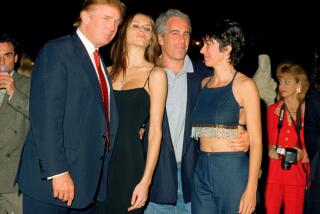Stewart Friend Testifies
- Share via
NEW YORK — Three days after selling her ImClone Systems Inc. stock, Martha Stewart told one of her best friends that ImClone founder Samuel D. Waksal had been trying to unload his own shares, the friend testified Thursday.
Mariana Pasternak’s testimony was some of the most damaging yet because it contradicted Stewart’s assertion to investigators that she didn’t recall having heard that Waksal was trying to sell.
Legal experts said Pasternak’s account sharply increased the chances that Stewart would have to take the stand in her own defense.
Pasternak, 50, said she had “a vague recollection” of chatting with Stewart on the evening of Dec. 30, 2001, while they were vacationing in Baja California. She went on to describe the conversation in detail.
The two were on a terrace adjacent to their $1,500-a-night suite at Las Ventanas al Paraiso, a resort in Los Cabos, discussing what their friends were doing for the end of the year, Pasternak said.
When the name of their mutual friend Waksal came up, Pasternak said Stewart told her that “Sam was walking funny at the Christmas party, that he was selling or trying to sell his stock, that his daughter was selling or trying to sell her stock.”
Stewart also said the stock price was falling “and I sold mine,” Pasternak said.
In a separate conversation during the vacation, although it wasn’t clear when or where, Pasternak said Stewart remarked: “Isn’t it nice to have brokers who tell you those things?”
At that, Stewart’s chief lawyer, Robert G. Morvillo, leapt to his feet to object that the remark was without context, “could mean anything” and should be stricken from the record.
After the jury of eight women and four men was dismissed for the day, U.S. District Judge Miriam Goldman Cedarbaum agreed to instruct the jury about how to regard the remark. She asked prosecution and defense lawyers to propose how to word her instruction.
Stewart, 62, and her former stockbroker, Peter E. Bacanovic, 41, are charged with lying to investigators and concocting a false story to cover up the circumstances of her Dec. 27, 2001, trade.
The $228,000 sale of ImClone shares came a day before an adverse regulatory ruling that caused the stock to dive.
Federal prosecutors say Stewart lied in part to prevent damage to her company, Martha Stewart Living Omnimedia Inc., which publishes Stewart’s magazine and markets products based on her sense of domestic style.
Star government witness Douglas Faneuil, Bacanovic’s former assistant at Merrill Lynch, testified earlier that at his boss’ insistence, he tipped off Stewart that the Waksals were anxiously trying to sell their stock, and she quickly ordered him to sell all 3,928 of her shares.
Pasternak’s testimony backed up Faneuil’s account.
“I don’t see how Martha Stewart can deflect this without taking the stand,” New York securities lawyer Jacob H. Zamansky said Thursday.
He added that it would be impossible for any jury instruction -- no matter how carefully worded -- to erase the effect of the remark about how nice it is having “brokers who tell you those things.”
Stewart’s defense team has not said whether she would take the stand.
Much of Thursday was taken up with lengthy testimony by Secret Service agent Larry Stewart -- no relation to the defendant -- identified as the government’s top expert on ink.
The agent Stewart described extensive testing of a document crucial to the defense.
The document is a sheet of paper listing Martha Stewart’s stock holdings that Bacanovic printed out several days before Stewart’s ImClone sale. Next to the ImClone listing is the handwritten notation “@ 60,” which the defense contends supports Stewart and Bacanovic’s assertion that they had a prior arrangement to sell her stock if it fell to $60 a share.
But the ink expert testified that his tests showed that the ink in that notation was different than that used in all the other ink jottings on the page. He acknowledged the tests could not determine when Bacanovic had written the “@ 60” notation.
The defense will cross-examine Pasternak this morning. The prosecution is expected to rest its case today.
Stewart’s defense won a minor victory earlier Thursday when Cedarbaum ruled out prosecution attempts to get James Follo, the chief financial officer of Stewart’s company, to detail Stewart’s apparent nit-picking over trivial expense-account items.
Questioned without the jury present, Follo said he occasionally clashed with Stewart over expenses for which she sought reimbursement but that he thought should be disallowed as personal rather than business-related. Some of the disputed expenses involved hair styling.
Finally Cedarbaum agreed with defense objections that the line of questioning would unfairly prejudice jurors.
The prosecution sought the executive’s testimony to support the contention that Stewart cared a lot about small sums of money.
The defense argues that Stewart, worth more than $500 million at the time of her ImClone sale, wouldn’t have focused much attention on the relatively small sum involved in the trade.
More to Read
Inside the business of entertainment
The Wide Shot brings you news, analysis and insights on everything from streaming wars to production — and what it all means for the future.
You may occasionally receive promotional content from the Los Angeles Times.










